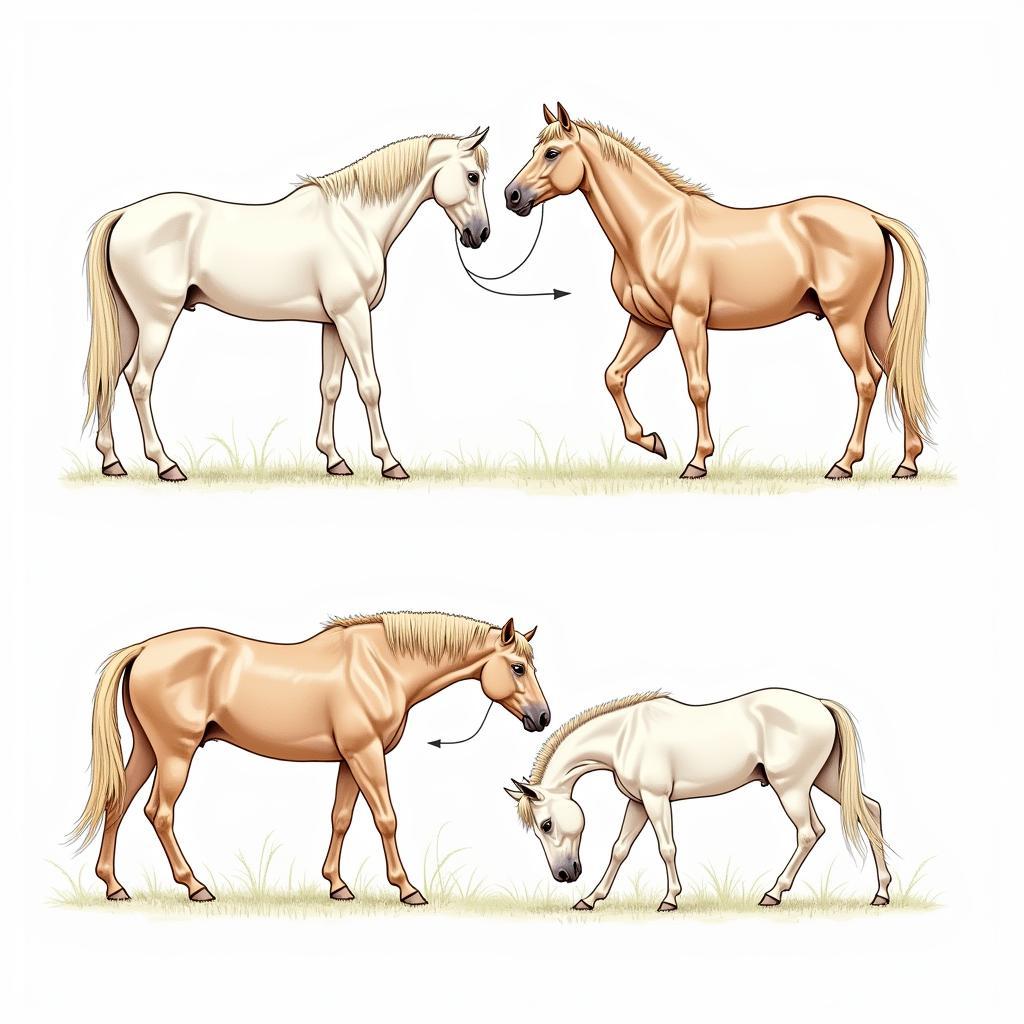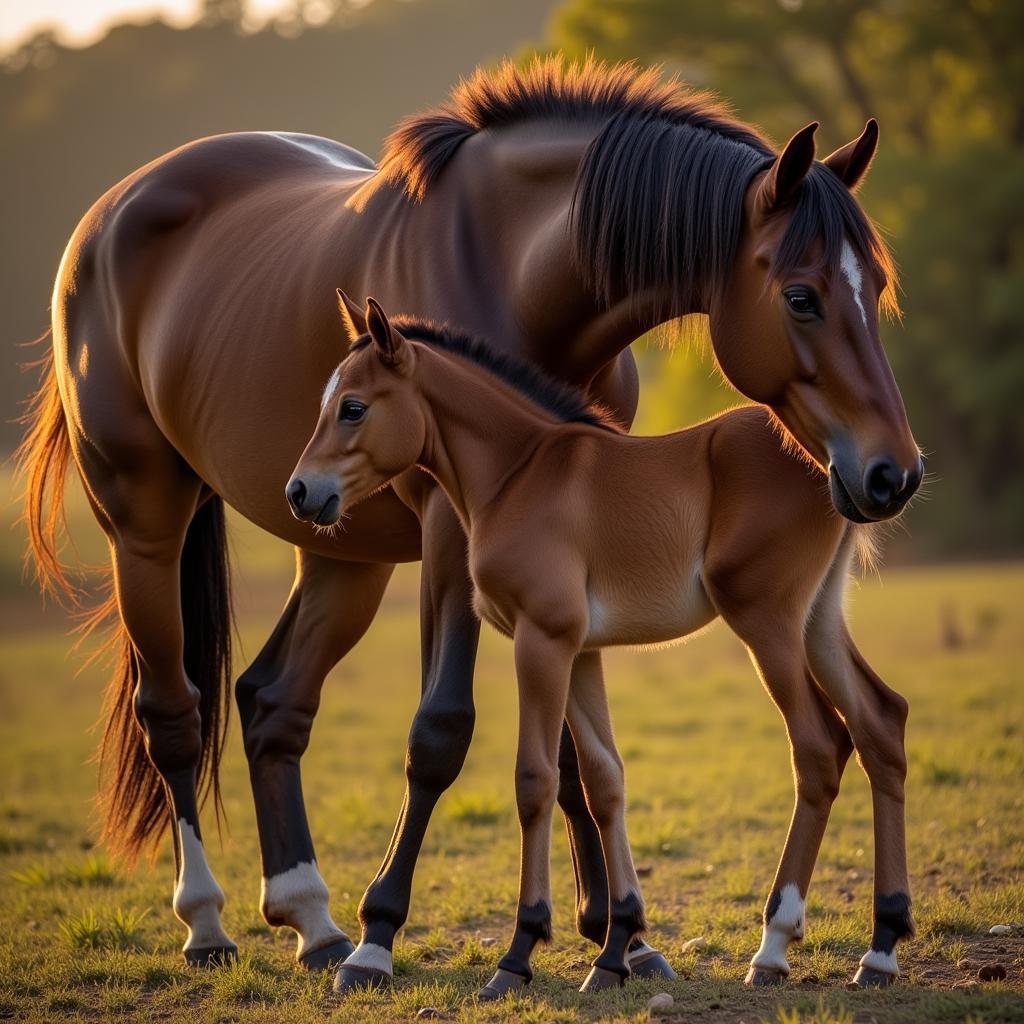When it comes to the animal kingdom, the subject of reproduction can be fascinating and complex. Horses, with their majestic presence and powerful physique, are no exception. Understanding how horses mate and reproduce is not only intriguing from a biological standpoint but also crucial for horse owners and breeders.
This article delves into the intricacies of horse breeding, addressing the common question of “Horses Having Sex With Horses” with a focus on providing accurate and valuable information.
The Biology Behind Horse Mating
Horses, like many other mammals, reproduce sexually. This means that for a mare (female horse) to become pregnant, a stallion (male horse) must deposit sperm into her reproductive tract. This act is what’s commonly referred to as “horses having sex.”
Here’s a breakdown of the process:
- Estrous Cycle: A mare goes through a regular cycle called the estrous cycle, commonly referred to as “being in heat.” During this cycle, which lasts about 21 days, she becomes receptive to mating for a period of 4 to 7 days.
- Courtship and Mating: When a mare in heat encounters a stallion, they engage in courtship behaviors. The stallion may display interest by sniffing, nickering, and gently biting the mare’s neck. The mare, if receptive, will signal her willingness by standing still and raising her tail. The stallion then mounts the mare from behind to mate.
- Fertilization: During mating, the stallion ejaculates sperm into the mare’s vagina. The sperm then travel to the fallopian tubes, where fertilization of an egg can occur.
 Horse Mating Process
Horse Mating Process
Factors Influencing Successful Breeding
While the act of mating might seem straightforward, several factors can influence successful horse breeding:
- Timing: Breeding a mare at the optimal time during her estrous cycle is critical for successful fertilization.
- Stallion Fertility: The stallion’s sperm count and motility play a crucial role in successful breeding.
- Mare Health: A healthy mare with a well-functioning reproductive system is more likely to conceive.
- Environmental Factors: Factors like stress, nutrition, and overall management practices can impact breeding success.
Gestation and Birth
Once a mare is successfully bred, she enters a gestation period that lasts approximately 11 months. During this time, the fertilized egg develops into a foal within the mare’s uterus.
 Mare and Newborn Foal
Mare and Newborn Foal
Understanding the nuances of horse breeding is essential for anyone involved in equine care, from hobbyists to professional breeders. By grasping the biological processes and recognizing the factors that contribute to successful reproduction, we can better appreciate the complexities of the natural world and ensure the well-being of these magnificent animals.
Frequently Asked Questions About Horse Breeding
1. How often do horses mate?
The frequency of mating in horses can vary depending on factors like the presence of a mare in heat and the stallion’s libido. However, a stallion may attempt to mate multiple times a day when a mare in heat is present.
2. How long does it take for horses to mate?
The actual act of mating in horses is relatively quick, typically lasting only a few minutes.
3. Can horses mate at any time of year?
Horses are seasonally polyestrous animals, meaning they have multiple estrous cycles during a specific time of year. They are typically more fertile during the spring and summer months.
4. How can you tell if a mare is pregnant?
There are various signs of pregnancy in mares, including behavioral changes, physical changes in the mare’s body, and veterinary tests like ultrasound examinations.
5. Where can I find more information about [gestation calculator horse]?
For detailed information and tools related to horse gestation, you can visit our gestation calculator horse page.
Exploring Further: Horse Breeding Resources
Are you interested in delving deeper into the world of horse breeding? Our website offers a wealth of information on various aspects of equine care, reproduction, and more.
You might find these resources helpful:
- Understanding Horse Anatomy and Reproduction
- Choosing the Right Stallion for Your Mare
- Caring for a Pregnant Mare
For any further assistance or inquiries, please don’t hesitate to contact us.
Justus Horses USA: Your trusted source for all things horses!
Contact Us:
Phone: 0772127271
Email: [email protected]
Address: QGM2+WX2, Vị Trung, Vị Thuỷ, Hậu Giang, Việt Nam
Our dedicated customer support team is available 24/7 to assist you.